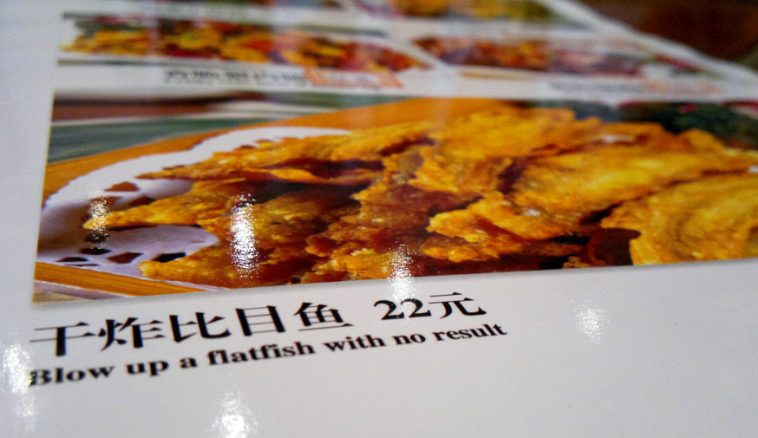
To put an end to the often hilarious, too-literal English translations seen on many Chinese menus, Beijing has announced official translations for the 2,158 most popular Chinese dishes.
From Beijing Daily:
Chinese dishes now have official English translated names
四喜丸子 (sìxǐwánzi) translated as “Four Glad Meat Balls”, 木须肉 (mùxūròu) as “Wood Mustache Meat”, 醉蟹 (zuìxiè) as “Drunk Crab” … these English translations of Chinese dishes, which cause people to laugh without wanting to, could be eradicated from our city’s menus. In the past few days, the Municipal Office of Foreign Affairs and the “Beijing Speaks Foreign Languages” Office have jointly published “Cuisine Translations Guide: How to Translate Chinese Menus Into English” which gives the “official names” for 2,158 Chinese dishes.
[…]
“The names of Chinese dishes not only include information about the ingredients, but also involve a lot of culture, historical events, people’s names et cetera, to form a unique naming system.” The relevant official at the Municipal Office for Foreign Affairs said that many restaurants’ menus are full of strange descriptions that are not only incomprehensible to foreigners but incomprehensible even to Chinese teachers of English who are used to “Chinglish”.
[…]
The relevant official at the Municipal Office for Foreign Affairs said that Beijing restaurants may refer to the translations in the manual when printing menus, but it would not be made compulsory.
Some dishes were translated wholly into English, whereas certain dishes or ingredients unique to China kept the original name but in romanized pinyin.
Other examples of translations published by the guide include:
(rather than “Chicken Without Sex”)
(rather than “Red Burned Lion Head”)
(rather than “Tofu Made by Woman with Freckles”)
(rather than “Dumplings”)
Comments from Sina Weibo:
Kelly-瑩:
We can finally bid goodbye to Chinglish.
__南兄:
So from now on 刘军 is “Liu the soldier”, and 陈洋 is “Chen the sea”, right? In the USA from the time of the Gold Rush until now, “won tun mien” and “ho funn” have been used without any problems, even now there’s no such thing as an “official name”. If you want to be friendlier with foreigners, what Chinese restaurants should do most is to not make a racket collecting plates and sweeping the floor when customers haven’t finished eating and you haven’t even closed shop yet.
Jorge佐治:
Official Chinese dish translations are still mostly translations of the meaning rather than the sounds, I still don’t understand why … “Sushi” in English is just “sushi”, it’s not “raw fish on sweet sour rice”. “Pizza” in English is just “pizza”, not “meat and veggie pancake with tomato sauce”. The whole world’s food is translated phonetically into English based on each country’s own language, why do Chinese dish names have to be translated by meaning? If foreigners don’t understand, they’ll go and learn.
嗨金刚:
The most incredible English name of a dish I’ve ever heard is probably that of 皮蛋 [pi dan]. Why is it “1000 years egg”?! What I’m eating must be a relic excavated from the Song Dynasty!
子优2010:
China’s dish names are infused with China’s culinary culture, to simply express them in English is not easy.
昂望星空的仲夏:
We can’t just use pinyin for these Chinese dish names, instead we just have to translate them into English.
伤者归来:
Are foreigners going to eat more if you translate dish names into English?!
非著名牙医–30亩地V:
It’s really difficult to use the few English letters to explain Chinese culinary culture.
九菊妻:
Let them foreigners go transliterate based on the Chinese pronunciation, why the fuck should we have to translate into English? What foreigners call “sofa”, don’t we also call “sofa”? Or are you saying we should translate this into “soft cushy chair”?!
空心月餅LP:
敢问皮蛋瘦肉粥,英文怎么讲,”>Dare I ask what do you call “皮蛋瘦肉粥” [pi dan shou rou zhou] in English?
What do you think? Of the official names? Of translation vs. transliteration? What are your favorite Chinglish Chinese menu items?


87 Comments
Leave a ReplyOne Ping
Pingback:» End-Of-Week Links: Wen Jiabao, Bo Xilai, Zhang Dejiang, Dolkun Isa Beijing Cream